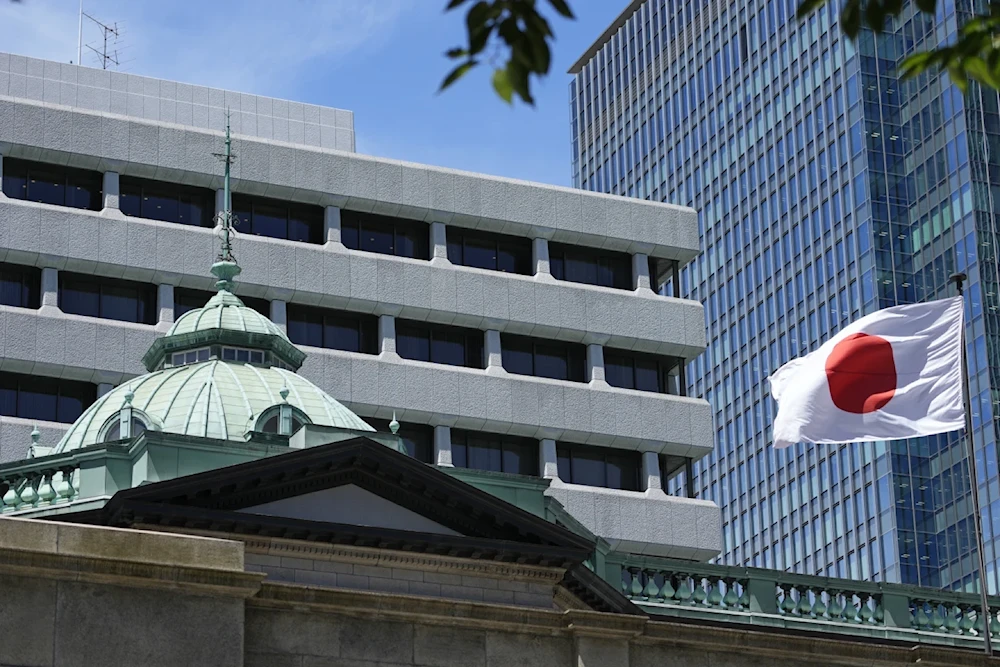Japan ends negative rates, markets embrace for decision aftermath
Bank of Japan was the last central bank in the world to maintain a negative interest rate.
-

A Japanese flag flutters at the Bank of Japan headquarters in Tokyo, on Thursday, July 29, 2022. (AP)
Japan's central bank has discontinued its policy of negative interest rates after eight years, marking a significant change to one of the most aggressive monetary easing programs globally, which aimed to increase bank lending and boost demand.
The Bank of Japan (BOJ) has made its first interest rate hike in 17 years, raising the short-term policy rate from -0.1% to a range between zero and 0.1%. However, analysts caution that due to a delicate economic recovery, any future increases in borrowing costs will likely be gradual.
This means that the BOJ is now the final central bank to move away from negative interest rates, as it assessed that it has the 2% inflation rate "within sight."
Read more: Japan unveils $16.8Bln package to combat price hikes: Reports
First rate hike in nearly two decades
The decision was supported by nine of BOJ's policy board members and opposed by two, the Kyodo News reported.
The recent wage growth has been a significant factor in boosting confidence among members of the BOJ board concerning achieving their 2% inflation target. This target has been elusive for Japan, which has struggled with deflation and economic stagnation for decades.
The agreement between Japan's major employers and labor unions for a substantial 5.28% wage increase is particularly noteworthy. This wage hike is the largest since 1991, indicating a significant shift in wage policies. The hope is that this increase will kickstart a "virtuous cycle" where higher wages lead to increased consumer spending, which drives up prices and stimulates further economic growth.
Read more: Japan to add new sanctions on Russia, prioritize Kiev support in 2024
The pace of this wage increase is also remarkable, being the fastest in over three decades. This development is considered a positive sign for Japan's economy, indicating a potential turning point in its long-standing struggle against deflation.
Before the decision was made, Izumi Devalier, head of Japan economics at BofA Securities said “This would be the first rate hike in 17 years, so it has a lot of symbolic significance."
“But the actual impact on the economy is very small,” she said, noting that the BOJ will probably maintain its resolve to keep monetary conditions loose. “We would not expect a substantial rise in funding costs or household mortgage rates.”
Official trust in the BOJ
In 2023, Japan experienced a temporary surge in inflation to its highest level in over 40 years. This increase led households to adopt more frugal spending habits, adding to the challenges faced by the country's prime minister, Fumio Kishida. However, the inflation rate remained significantly lower than the levels recorded in many other countries, where it had recently spiked, causing concerns about the cost of living.
Increasing the interest rate will have several effects on Japan's economy. Firstly, it will lead to higher borrowing costs for consumers and businesses, including mortgages and business loans, slowing down consumption and investment.
Read more: Japan falls behind troubled Germany on world's biggest economies list
Secondly, the higher interest rate will escalate the country's expenses for servicing its national debt, which stands at one of the highest levels globally, at around 260% of its gross domestic product (GDP).
“We trust the BOJ,” Kyodo quoted a source close to the prime minister, adding that the decision “is in their hands”.

 4 Min Read
4 Min Read








